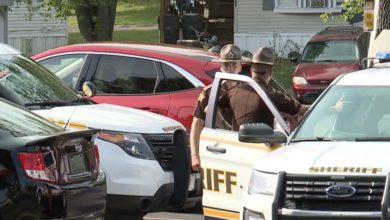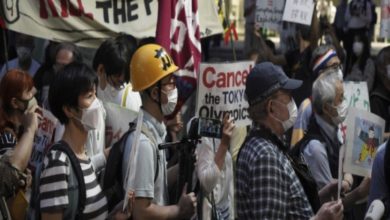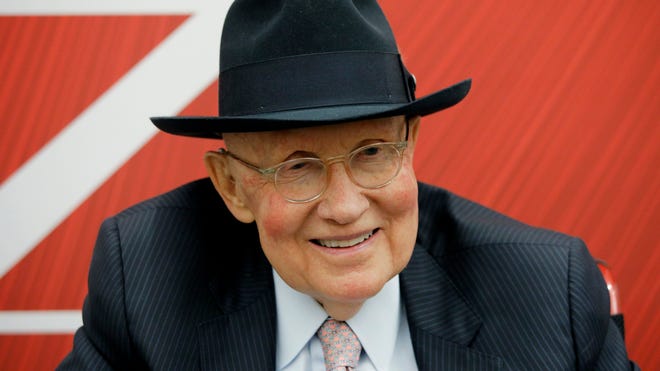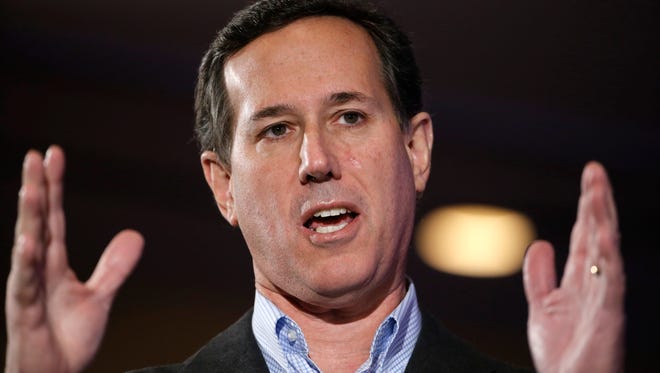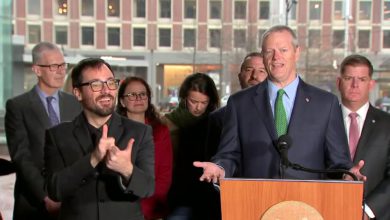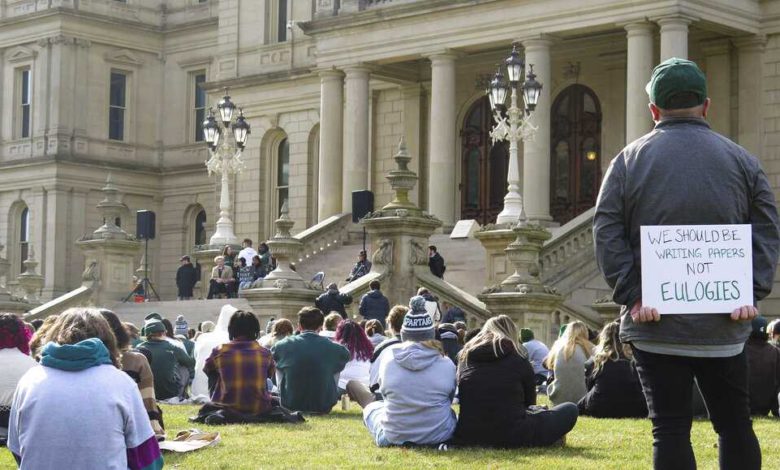

Video above: Michigan State students gather in wake of shootingPublic access to most buildings at Michigan State University will be restricted at night, the school announced Wednesday, one in a series of security steps in response to the February shootings that killed three students and wounded five more.Students, faculty and staff will need to use their campus ID cards to gain electronic access to buildings between 6 p.m. and 7:30 a.m. on weekdays, starting March 13, officials said. There will be exceptions for events typically open to the general public.Michigan State plans to make it possible to lock 1,300 classrooms from the inside by the fall semester. Students, faculty and staff will also be required to complete "active violence intruder training" next fall."The actions we are outlining today position us on a path to reclaim our sense of safety that was so violently taken away from our community," President Teresa Woodruff said. "These steps will provide more robust security on campus while better preparing our community to respond in these unfortunate situations."A gunman shot eight students after 8 p.m. Feb. 13. Two students were killed at an academic building, Berkey Hall, while another was slain at the MSU Union, a gathering place for students and the public. Both remain closed.The shooter, Anthony McRae, 43, later killed himself away from campus, police said.Michigan State has 50,000 students and hundreds of buildings in East Lansing, about 90 miles northwest of Detroit.Ryan Dodge, a 19-year-old student, said mandatory training to deal with armed intruders, unfortunately, is a sign of the times."Fire drills, tornado drills — those are natural occurrences," he said. "There's nothing natural about a shooter coming on campus, but it's just as dangerous now."The university said it will expand its current network of 2,000 campus cameras. It also will hire an outside party to analyze the immediate response to the shootings and make the report public.Video below: Rally held at MSU as students return to campus"It's reasonable in that it could be much more onerous," Michigan State journalism professor Eric Freedman said of the new building policy. "Does it make it safer? I'm not sure. Will people feel safer? Maybe."No change to building access during daytime hours was announced. Michigan State already restricts access to the living areas in residence halls, though dining areas on the ground floor typically are open to the public.Jason Russell, president of Secure Education Consultants, which assesses security at K-12 schools, said Michigan State so far is taking a "measured reaction" to security in the wake of the shootings."The things they're adding are appropriate," said Russell, a former Secret Service agent whose daughter is a Michigan State student. "College campuses are inherently difficult to secure, unlike a K-12 school where kids are in the same building. MSU is huge."The Michigan State shootings were the latest in what has become a deadly new year in the U.S. Dozens of people have died in mass shootings so far in 2023. In 2022, there were more than 600 mass shootings in the U.S. in which at least four people were killed or injured, according to the Gun Violence Archive.
Video above: Michigan State students gather in wake of shooting
Public access to most buildings at Michigan State University will be restricted at night, the school announced Wednesday, one in a series of security steps in response to the February shootings that killed three students and wounded five more.
Students, faculty and staff will need to use their campus ID cards to gain electronic access to buildings between 6 p.m. and 7:30 a.m. on weekdays, starting March 13, officials said. There will be exceptions for events typically open to the general public.
Michigan State plans to make it possible to lock 1,300 classrooms from the inside by the fall semester. Students, faculty and staff will also be required to complete "active violence intruder training" next fall.
"The actions we are outlining today position us on a path to reclaim our sense of safety that was so violently taken away from our community," President Teresa Woodruff said. "These steps will provide more robust security on campus while better preparing our community to respond in these unfortunate situations."
A gunman shot eight students after 8 p.m. Feb. 13. Two students were killed at an academic building, Berkey Hall, while another was slain at the MSU Union, a gathering place for students and the public. Both remain closed.
The shooter, Anthony McRae, 43, later killed himself away from campus, police said.
Michigan State has 50,000 students and hundreds of buildings in East Lansing, about 90 miles northwest of Detroit.
Ryan Dodge, a 19-year-old student, said mandatory training to deal with armed intruders, unfortunately, is a sign of the times.
"Fire drills, tornado drills — those are natural occurrences," he said. "There's nothing natural about a shooter coming on campus, but it's just as dangerous now."
The university said it will expand its current network of 2,000 campus cameras. It also will hire an outside party to analyze the immediate response to the shootings and make the report public.
Video below: Rally held at MSU as students return to campus
"It's reasonable in that it could be much more onerous," Michigan State journalism professor Eric Freedman said of the new building policy. "Does it make it safer? I'm not sure. Will people feel safer? Maybe."
No change to building access during daytime hours was announced. Michigan State already restricts access to the living areas in residence halls, though dining areas on the ground floor typically are open to the public.
Jason Russell, president of Secure Education Consultants, which assesses security at K-12 schools, said Michigan State so far is taking a "measured reaction" to security in the wake of the shootings.
"The things they're adding are appropriate," said Russell, a former Secret Service agent whose daughter is a Michigan State student. "College campuses are inherently difficult to secure, unlike a K-12 school where kids are in the same building. MSU is huge."
The Michigan State shootings were the latest in what has become a deadly new year in the U.S. Dozens of people have died in mass shootings so far in 2023. In 2022, there were more than 600 mass shootings in the U.S. in which at least four people were killed or injured, according to the Gun Violence Archive.
Source link

